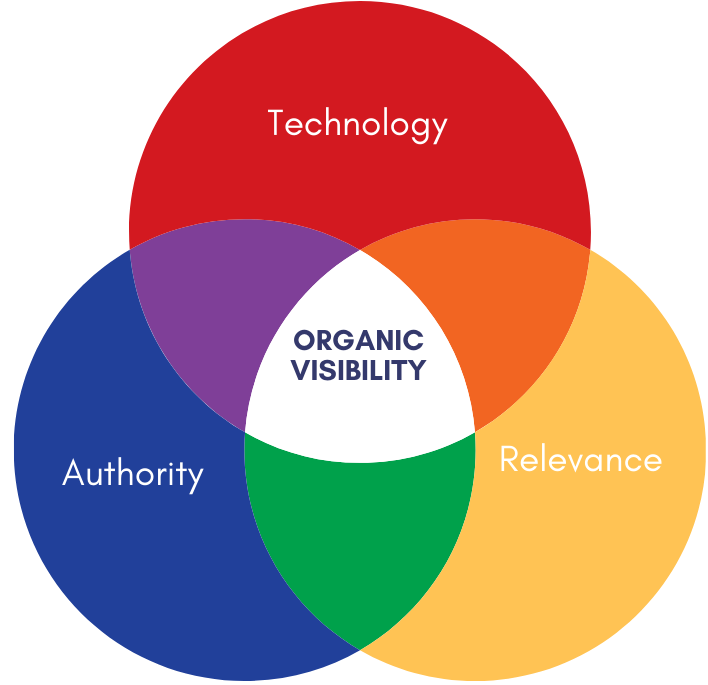Are you looking to learn more about SEO? You’ve come to the right place. In this guide, we’ll discuss everything you need to know, starting with the very basics.
Are you an experienced SEO looking for specific details? Feel free to skip ahead.
What is SEO?
SEO or an acronym of Search Engine Optimization is the art and science of drawing more natural, high-quality, organic traffic from search engines results page (SERP) to your website, without paying for it.
Let’s take a step back to see what that means.
More high-quality traffic: you get more traffic from search engines results page (SERP) by improving your ranking, and by increasing the likelihood people will click on your website in the search results.
However, we don’t just want more visitors from search engines, we also want these visitors to be of high quality. If you run a webshop selling dog food, you want to target as many dog owners in the area you serve. You don’t want to target cat owners or dog owners in a country where you don’t sell your products. You want as much relevant traffic to your website, and SEO is a great wat to do that.
From search engines: there are various search engines out there, but our main focus is on Google. In most countries, Google is by far the most-used search engine, and you’ll often see that anything that works for Google, will also work for other search engines.
Without paying for it: Whenever you do a search on Google, you’ll see advertisements on top of the results. Businesses are paying to be on top of the results. This is called Search Engine Advertising or SEA. This can be a useful way to quickly appear on top of the results, but you’ll have to pay for every click.
In contrast, SEO or organic results, are not paid for. They are showing up on top because Google thinks they are the most relevant results for that search.
Why is SEO important?
Traffic from search engines is super important for every online business. Think about it: how often do you use Google to find something? Every second, Google receives over 80,000 searches from around the world. The average person uses Google 3 to 4 times every day.
Being the top result for relevant searches can drive great amounts of new clients and revenue to your business.
Another great thing about SEO is that it’s a long term investment. Your SEO activities will pay dividends in the future, even after you stop working on it. Compare that to other forms of online marketing: stop spending money on SEA or affiliate marketing, and you won’t see any new visitors coming from those activities.
Is SEO difficult?
SEO can be difficult and challenging at first, but when you start to learn Google's algorithmic policies, you can easily rank your website. To simplify your SEO approach, your main goal is to:
1) Site crawl friendly: Make sure your site is easily crawlable for search engine bots
2) Content writing: Once you've identified search terms that are related to your website, write content that caters to that intent.
SEO needs time, you'll need some patience.
How does SEO work?
SEO is a very broad area consisting of a lot of very different activities. However, they can be summarized in the following three pillars of SEO.

1 - Technology
Technical SEO is about optimizing your website so search engines can crawl it, and understand it. It involves a good website structure, fast loading pages, correct sitemaps, valid HTML, but also correct headings, internal linking structure, and structured data.
2 - Relevance
Content plays a large role in SEO. If your website doesn’t have content that is relevant for your audience, Google has no reason to send searchers your way. Only if your content helps people find answers to their search queries, your site will rise to the top of the search engine rankings.
The relevance of this content should not just be in the main text. Page titles, meta descriptions and headings should be a reflection of the content on that page.
High-quality content is unique, well-researched and written with the right audience in mind. Always write content for end-users, not for search engines.
3 - Authority
A great technical foundation with relevant content is a good start, but you also need to build authority to improve your rankings. As an SEO, it’s your job to turn your website into a trusted source of information. Links from other websites to yours play a big role in gaining authority, but reviews, a good contact page and other signals of trustworthiness also help build authority. When it comes to authority, Google evaluates your site using EEAT.
Bringing it all together
As you see, these three pillars are very different in nature. However, they really work in tandem: if one of these pillars is not set up correctly, don’t expect your website to rank.
To succeed in SEO, you’ll need to have some understanding of each of these pillars. That’s what makes SEO somewhat complicated, but also a lot of fun!


